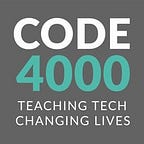It is week four of our social media campaign raising funds and awareness for Code4000. It is also my last term as a historian at Peterhouse as once I have overcome the labours which are my final examinations, I will only level up into the even more hazardous terrain of what adolescents respectfully refer to as “real-life”.
So, the other day I took a break from reformatting coursework footnotes for the third time to dedicate creative time towards writing this very blog. The step in “The Hero’s Journey” which was dedicated to me was that of “Crossing the Threshold” where the Hero takes the first step and moves from the world that they know to the unknown world. This is the beginning of conscious habit changing. This is moving beyond fear into the adventure and challenge of the unknown.
My thoughts raced to the threshold I myself am about to cross; from the world of deadline extensions and break-out rooms into that of taxes, responsibilities and overpriced brunch. As with any other humanities student confronted with the thought of reality and work, my thoughts evolved into quasi-philosophical ruminations about my role in society, how I could help the world and whether the world could even be helped in the first place (and of course how I was going to fund my weekly Brewdog expenditures while doing all this). Rapidly my brain conjured three conclusions:
- Shayan (that’s me) you are not the hero. Amanul is the hero.
- I need to take the time to think; not about ‘What?’ but about ‘Why?’.
- The world can be helped, but if you want to do so you have got to stop procrastinating.
In light of those conclusions, I looked at Amanul’s story once again. I thought about how he transformed what could have been the worst experience of his life into one that brought him happiness and set him up for the future. It made me think about justice itself, and here are my thoughts:
Legal matters are often at the heart of the news-cycles and public discourse. Often this is the case because the case transcends the trialling of individuals, becoming central to questions about human rights and equality. Having worked with Code4000, and having looked at the effort they and the students enrolled in their programme put into genuine rehabilitation, I have realised that it is not about any one case or any one trial. Society needs to re-evaluate what our justice system is about. I am not trying to sound like I am talking about huge ideas such as “democratic values” or “liberty” or “judicial independence” and so on. I am talking very simply about the purpose of our justice system. Having asked people around me this question their answers seem to differ. Some say revenge, others say equality or rehabilitation or even protection. While all of these seem true to an extent, to me personally only one answer could be the correct one: to reduce crime. Fundamentally, laws are made to be followed because, in theory, we all agree that they should be and that we want to live in a world in which everyone does. This is because laws promote equality, laws grant rights and laws offer protection. Prisons, police officers, judges and the court itself, while they are there to enforce laws and to enforce them fairly, should exist as part of a society that works towards a world in which laws aren’t broken at all.
Back to our heroes, Amanul and Code4000. Amanul learnt how to code, Code4000 taught him how to code and now Amanul can contribute to society, partake in exactly the world I was previously talking about; the world of taxes, responsibilities and brunch, overpriced or not. Amanul might have broken laws, but he was able to use his time rehabilitating and learning so he could cross this crucial threshold. This story is one which is reflected in all the heroes who took on the challenge of Code4000 and were able to employ their time in incarceration to bounce back and make a difference in society. The reoffending rate of Code4000 graduates is at 0%. However, unfortunately this statistic is only as impressive as it is when compared to the reoffending rate of 46% across the UK. 46% within the first year of being released. Organisations such as Code4000 are taking huge strides towards reducing this number, but the number is too big for them to do it on their own.
This is ultimately, what my debris of thoughts and ideas here is trying to culminate in. Whatever our justice system is doing right now, it is not reducing crime. Amanul’s story is an anomaly. Regardless of the reasons, this is a failing of society. There is clearly something wrong and projects like that of Code4000 are trying to fix it, but they are up against a whole system. We live in a system which needs to take a step back and think about the purpose of their work. We are part of this system and have to be active agents in changing it. Amanul crossed the threshold, and Code4000 tries to cross it every day: now it is our turn to do the same.
You can help support the work of Code4000 by making a donation here.
